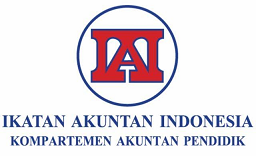ANALISIS KESIAPAN KERJA MAHASISWA AKUNTASI DI ERA 4.0 MELALUI VARIABEL KEAHLIAN AKUNTANSI DAN LITERASI DIGITAL
Abstract
This research aims to explore the interplay between digital literacy, accounting skills, and the employability readiness of prospective accountants in the era of Industry 4.0. By delving into the aspects of digital skills and accounting competencies, the study not only contributes to understanding the dynamics of the accounting profession in the face of technological changes but also adds value to the development of relevant education and training strategies. The data collection method employed in this research involves the use of a questionnaire, with 92 respondents as the sample. The analysis tools utilized include Smart PLS 4.0 and MiniTab 19. The research findings indicate that, partially, accounting skills have a positive and significant influence on employability readiness. Similarly, digital literacy has a positive relationship with employability readiness. Simultaneously, accounting skills and digital literacy jointly influence the employability readiness of prospective accountants.
Downloads
References
Andika, Bramanti Wisnu, Sari, R. C. (2022). Analisis Pengaruh Kompetensi, Kemampuan Komunikasi, Adaptabilitas, Work Ethics, Logical Thinking, Dan Penguasaan Teknologi Terhadap Kesiapan Kerja Mahasiswa Akuntansi Pada Era Revolusi Industri 4.0. PROFITA : Kajian Ilmu Akuntansi, 9(6).
Aryanto dan ida farida. (2021). Presepsi Pengguna Aplikasi Pencatatan Keuangan Berbasis Android Pada Umkm Di Kota Tegal. Akuntansi Keuangan Dan Bisnis, 14(2), 281–290.
Azzahra, B. (2020). Perusahaan Melalui Artificial Intelligence & Tech Analytics Pada Era Disruptif. Jurnal Riset Akuntansi Dan Keuangan, 16(2). http://e-journalfb.ukdw.ac.id/index.php/jrak/article/view/376/358
Endang Suhendar, O. R. (2022). Analisis Komparasi Penerapan Siklus Akuntansi Konvensionaldengan Akuntansi Berbasis Komputer Di Era Disrupsi. Students Conference On Accounting and Business (SCoAB), 1(1). http://www.jp.feb.unsoed.ac.id/index.php/scoab/article/view/3110
Erawan, N. M. A. N. P., & Wirakusuma, M. G. (2022). Kesiapan Kerja Calon Akuntan di Era Pandemi Covid-19. E-Jurnal Akuntansi, 32(4), 1032. https://doi.org/10.24843/eja.2022.v32.i04.p15
Faradhiba, N. F. (2022). Era Disrupsi Digital Pada Kesiapan Calon Pekerja Akuntan. SEIKO : Journal of Management & Business, 4(3), 600–605. https://doi.org/10.37531/sejaman.v4i3.2498
Frey, C. B., & Osborne, M. A. (2017). The future of employment: How susceptible are jobs to computerisation? Technological Forecasting and Social Change, 114, 254–280. https://doi.org/10.1016/j.techfore.2016.08.019
Ghazali, I, Latan, H. (2015). Partial Least Squares Konsep Teknik Dan Aplikasi Dengan Program Smart PLS 3.0. Universitas Diponegoro.
Ghozali Imam. (2016). Aplikasi Analisis Multivariete dengan Program IBM SPSS 23 (8th ed.). Badan Penerbit Universitas Diponegoro.
Iswanto, A. C., & Wahjono. (2019). Pengaruh Revolusi Industri 4.0 terhadap Ilmu Akuntansi. Infokam, 1, 1–6.
Jogiyanto & Willy Abdilah. (2014). Konsep dan Aplikasi PLS (Partial Least Square) Untuk Penelitian Empiris. BPFE.
Lestari, S., & Santoso, A. (2019). The Roles of Digital Literacy, Technology Literacy, and Human Literacy to Encourage Work Readiness of Accounting Education Students in the Fourth Industrial Revolution Era. KnE Social Sciences, 3(11), 513. https://doi.org/10.18502/kss.v3i11.4031
Merlina, M., & Nuraini, A. (2020). Analisis Persepsi Dosen Akuntansi Dan Mahasiswa Akuntansi Mengenai Peranan Akuntan Di Era Revolusi Industri 4.0. JAS-PT (Jurnal Analisis Sistem Pendidikan Tinggi Indonesia), 4(2), 149. https://doi.org/10.36339/jaspt.v4i2.347
Mutmainah, S. (2020). Literasi Baru Sebagai Bentuk Penanaman Nilai-Nilai Karakter dalam Pembelajaran Bahasa Indonesia MI di Era Disrupsi. Auladuna : Jurnal Prodi Pendidikan Guru Madrasah Ibtidaiyah, 2(1), 54–68. https://doi.org/10.36835/au.v2i1.297
Pakpahan, Silvia Ratily, Nikmah, N. (2024). Kesiapan Kerja Mahasiswa Akuntansi di Era Disrupsi Teknologi Digital: Peran Keahlian Akuntansi, Literasi Digital, Literasi Manusia, dan Adaptabilitas Karir. Al-Kharaj : Jurnal Ekonomi , Keuangan & Bisnis Syariah, 6(2), 2547–2562. https://doi.org/10.47467/alkharaj.v6i
Prajanto, A. P., & Dian Pratiwi, R. (2019). Revolusi Industri 4.0: Desain Perkembangan Transaksi dan Sistem Akuntansi Keuangan. Jurnal Ilmu Manajemen Dan Akuntansi Terapan, 10(1), 86–96.
Premana, A., Fitralisma, G., Yulianto, A., Zaman, M. B., & Wiryo, M. A. (2020). Pemanfaatan Teknologi Informasi Pada Pertumbuhan Ekonomi Dalam Era Disrupsi 4.0. Jurnal Economic Management (JECMA), 1(1), 1–6. http://jurnal.umus.ac.id/index.php/jecma/article/view/219/130
Putri, R. Y., & Supriansyah, S. (2021). Pengaruh Literasi Digital terhadap Kesiapan Kerja Generasi Z di Sekolah Menengah Kejuruan. Edukatif : Jurnal Ilmu Pendidikan, 3(5), 3007–3017. https://edukatif.org/index.php/edukatif/article/view/1055
Rianto, J., & Rindrayani, S. R. (2023). Pengaruh Kompetensi Keahlian Akuntansi 4.0 Dan Pengalaman Prakerin 4.0 Terhadap Kesiapan Kerja 4.0. Jurnal Economina, 2(7), 1865–1875. https://doi.org/10.55681/economina.v2i7.684
Rosmida. (2019). Transformasi Peran Akuntansi Dalam Era Revolusi Industri. Inovbiz: Jurnal Inovasi Bisnis, 7, 206–212. www.ejournal.polbeng.ac.id/index.php/IBP
Setyaningsih, R., Abdullah, A., Prihantoro, E., & Hustinawaty, H. (2019). Model Penguatan Literasi Digital Melalui Pemanfaatan E-Learning. Jurnal ASPIKOM, 3(6), 1200. https://doi.org/10.24329/aspikom.v3i6.333
Sholihah, N. H., & Listiadi, A. (2022). Pengaruh Kompetensi Kejuruan Akuntansi Dan Kematangan Vokasional Terhadap Kesiapan Kerja Melalui Intervening Self-Efficacy. Jurnal Pendidikan Akuntansi Indonesia, 19(2), 01–19. https://doi.org/10.21831/jpai.v19i2.39310
Sugiyono. (2017). Metode Penelitian Kuantitatif, Kualitatif, dan R&D. CV Alfabeta.
Sukma Prabawati, S. (2019). Pengaruh Efikasi Diri, Pendidikan Kewirausahaan, Literasi Keuangan, dan Literasi Digital terhadap Perilaku Berwirausaha Siswa SMK Negeri 10 Surabaya PENGARUH. Jurnal Pendidikan Akuntansi (JPAK), 7(1).
Yoon, S. (2020). A study on the transformation of accounting based on new technologies: Evidence from korea. Sustainability (Switzerland), 12(20), 1–23. https://doi.org/10.3390/su12208669
Yulianti, M., Asniati, A., & Juita, V. (2021). Pengaruh Keahlian Akuntansi, Literasi Digital dan Literasi Manusia Terhadap Kesiapan Kerja Calon Akuntan di Era Disrupsi Teknologi Digital. Ekonomis: Journal of Economics and Business, 5(2), 449. https://doi.org/10.33087/ekonomis.v5i2.389

This work is licensed under a Creative Commons Attribution-NonCommercial-ShareAlike 4.0 International License.
Jurnal Akutansi dan Keuangan allows readers to read, download, copy, distribute, print, search, or link to the full texts of its articles and allow readers to use them for any other lawful purpose. The journal allows the author(s) to hold the copyright without restrictions. Finally, the journal allows the author(s) to retain publishing rights without restrictions
Authors are allowed to archive their submitted article in an open access repository
Authors are allowed to archive the final published article in an open access repository with an acknowledgment of its initial publication in this journal







